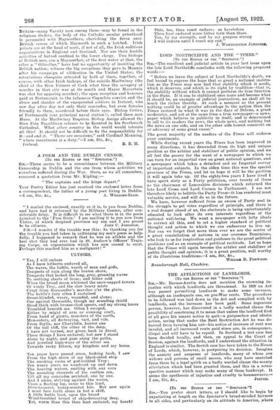LORD NORTHCLIFFE AND THE "TIMES."
[To THE EDITOR OP THE "SPECTATOR."]
Sin,—The excellent and judicial article in your last issue upon the late Lord Northcliffe concludes with the following pregnant words :—
"Before we leave the subject of Lord Northcliffe's death, we feel bound to express the hope that so great a national institu- tion as the Times may now find that stability which it needs, which it deserves, and which is its right by tradition—that is, the stability without which it cannot perform its true function in the State. If it can be stabilized once more and become what it should be, an example of judicial journalism, we shall all be much the richer thereby. At such a moment as the present nothing could be of greater advantage to the nation than the Times restored to what it was in the days of Delane, a great moderator, and yet at the same time a true newspaper—a news- paper which believes in publicity in itself, and is determined to sell to its readers the news, the whole news, and nothing but the news on one side, and on the other side honest comment on or advocacy of some great cause."
The great majority of the readers of the Times will endorse your sentiments.
While during recent years the Times has been improved in many directions, it has descended from its high and unique position as the arbiter and stabilizer of public opinion, and we all feel the poorer for the want of a newspaper to which we can turn for an impartial view on great national questions, and a newspaper which takes a detached and an Imperial survey of important subjects. In the olden time this was the special province of the Times, and let us hope it will be the position it will again take up. Of the eighty-two years I have lived I have spent sixty as a Party politician, over twenty of these as the chairman of Lancashire divisions which returned the late Lord Cross and Lord Curzon to Parliament. I am not therefore likely to belittle the Party Press—it has rendered most valuable service, and will do so in the future.
We have, however suffered from an excess of Party zeal in the struggle to get Votes regardless of principle, and there is a real danger ahead of us, the electorate is being unfortunately educated to look after its own interests regardless of the national well-being. We want a newspaper with lofty ideals to correct all this, and to set a higher standard of political thought and action to which we can endeavour to live up. Nor can we forget that more than ever we are the centre of a great constellation of nations in our overseas Dominions, who look to us for inspiration and guidance in the great political problems and as an example of political rectitude. Let us hope that the Times will again become the arbiter and stabilizer of public thought and opinion; it is a great position, well worthy of its illustrious traditions.—I am, Sir, &c., WILLIAM B FOBWOOD. Bromborough Hall, Cheshire.


































 Previous page
Previous page